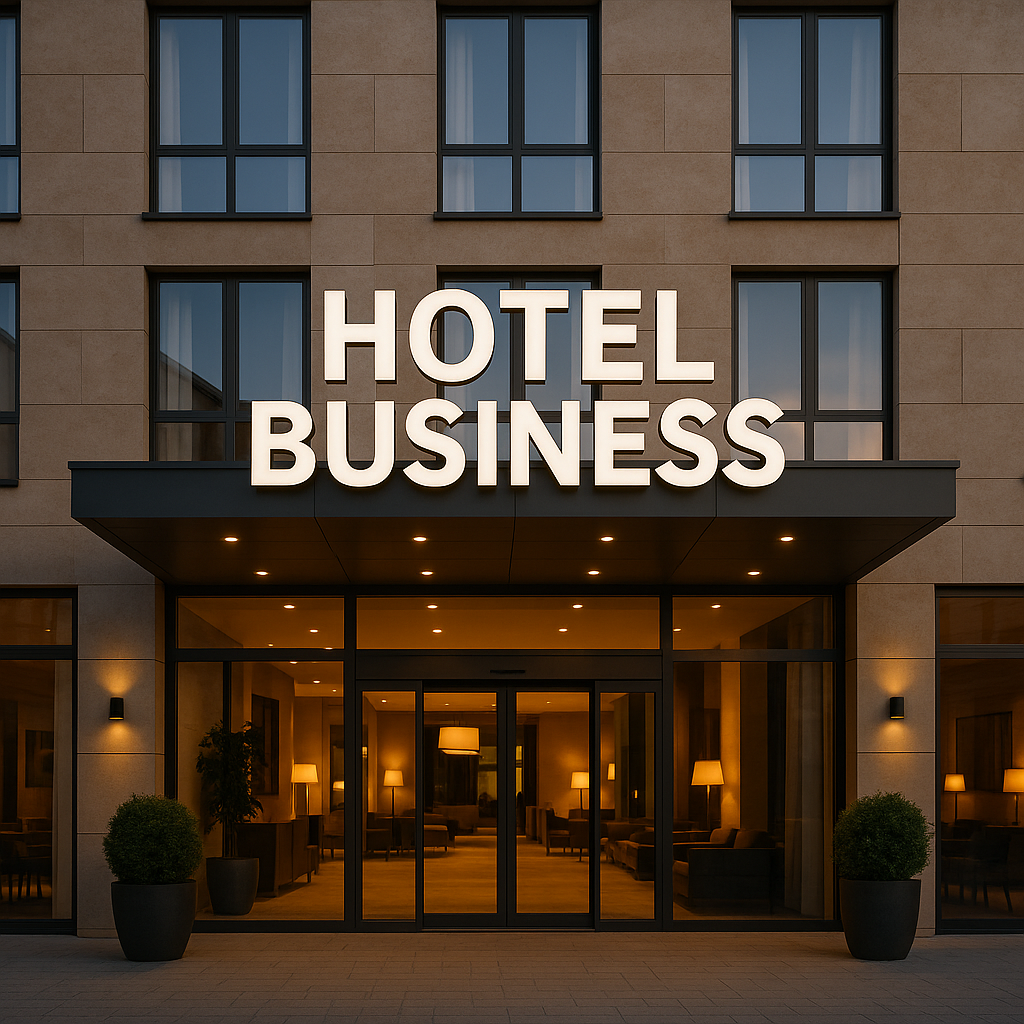- Analyse local tourism trends, competitor hotels, and potential customer demographics.
- Decide on your hotel concept (luxury, budget, boutique, etc.).
- Develop a detailed business plan outlining your vision, financial projections, marketing strategy, and operational plan.
PROCESS OF STARTING A HOTEL BUSINESS
-
Decide the Restaurant Type
Choose the type of hotel business based on your budget, location, and target audience such as (Based On Star Ratings, Based On Ownership Model, Based On Location, Based On Services & Amenities, etc)
-
Conduct Market Research
- Identify Target Audience – Business travelers, tourists, pilgrims, etc.
- Competitor Analysis – Study nearby hotels, pricing, services, and customer reviews.
-
Register the Business & Get Licenses
- Business Registration: Choose Sole Proprietorship, LLP, or Private Limited Company.
- GST Registration, Trade License, Fire & Safety License, Liquor License, FSSAI License, Music License etc.
-
Secure Funding for Your Restaurant
- Self-funding or bank loans (MSME loans, Mudra loans)
- Investors or partnerships: Find business partners or co-investors or Investor.
-
Choose a Suitable Location
- Should have high footfall(near markets, colleges, offices, malls).
- Ensure proper ventilation, kitchen space, and dining area.
- Check for parking space availability.
-
Set Up the Restaurant Infrastructure
- Purchase/Rent Property – Choose based on budget and location demand.
- Hotel Construction & Interior Design – Ensure good aesthetics, comfort, and functionality.
- Install Essential Facilities: Like Rooms with modern amenities, Power backup & water supply, Wi-Fi, TV, and air conditioning, Restaurant & kitchen setup, Security systems (CCTV, fire alarms), Parking space
-
Hire & Train Restaurant Staff
- Recruit Skilled Staff: Like General Manager, Front Office/Receptionist, Housekeeping, Kitchen & restaurant staff (chefs, waiters), Security personnel.
- Provide Customer Service Training and Hygiene & Food Safety Training.
-
Marketing & Branding
- Online Presence: Create a website, list on Google My Business, Unique name, logo, theme, and décor.
- Online Promotions: Register on OYO, MakeMyTrip, Goibibo, Agoda, Booking.com. Promote on Facebook, Instagram, Google Ads.
- Collaborations: Partner with tour operators and online travel agencies (OTAs).

TYPES OF HOTEL BUSINESS
BASED ON STAR RATINGS
a) 1-Star Hotels (Budget Hotels)
- Basic lodging with minimal amenities.
- Low-cost rooms, no luxury facilities.
- Target Audience: Budget travelers, backpackers.
- Examples: Local budget hotels, OYO Rooms.
b) 2-Star & 3-Star Hotels (Economy & Mid-Range Hotels)
- Comfortable rooms, in-house dining, and Wi-Fi.
- Suitable for business travelers & families.
- Examples: Ginger Hotels, Treebo, FabHotels.
b) 4-Star & 5-Star Hotels (Luxury Hotels)
- Comfortable rooms, in-house dining, and Wi-Fi.
- Suitable for business travelers & families.
- Examples: Ginger Hotels, Treebo, FabHotels.
BASED ON OWNERSHIP MODEL
a) Independent Hotels
- Owned and managed by individual entrepreneurs.
- No brand affiliation operates under its own name.
- Examples: Small family-run hotels, boutique hotels.
b) Chain Hotels
- Part of a hotel group or brand with standardized services.
- Examples: Taj Hotels, Radisson, Hilton, Marriott.
c) Franchise Hotels
- Hotel operates under a popular brand name but is owned by an independent entity.
- Franchisee pays a license fee to the hotel chain.
- Examples: OYO, Treebo, FabHotels, Holiday Inn.
d)Management Contract Hotels
- Owned by one company but managed by a professional hospitality company.
- Example: A local business owning a hotel managed by Taj or Marriott.
BASED ON LOCATION
a) City Hotels (Business Hotels)
- Located in commercial and metro cities.
- Provides conference halls, business centers, Wi-Fi, airport transfers.
- Examples: Novotel, Hilton, Taj Business Hotels.
b) Resorts & Beach Hotels
- Located near tourist destinations, beaches, mountains.
- Offers recreational activities, spas, adventure sports.
- Examples: Club Mahindra Resorts, The Leela Goa.
c) Resorts & Beach Hotels
- Near airports for transit passengers.
- Offers hourly booking, short stays.
- Examples: Ibis Airport Hotel, Holiday Inn Express.
d)Highway Hotels / Motels
- Located on national highways for travellers.
- Offers affordable rooms, food, and parking.
- Examples: Dhaba hotels, Highway Inn.
BASED ON STAY DURATION
a) Short-Stay Hotels
- Designed for 1-2 nights stay.
- Target Audience: Business travellers, transit passengers.
b) Extended Stay Hotels
- Serves customers staying for weeks or months.
- Includes kitchen facilities & laundry services.
- Examples: Service apartments, Airbnb, Studio Hotels.
BASED ON SERVICES & AMENITIES
a) Luxury Hotels
- 5-star or 7-star hotels with premium facilities.
- Expensive with elite clientele.
- Examples: The Oberoi, The Leela, Taj Palace.
b) Boutique Hotels
- Small, stylish, and unique hotels with personalized service.
- Located in tourist places, cities, or heritage sites.
- Examples: Neemrana Fort Palace, Raas Jodhpur.
c) Budget Hotels
- Affordable, minimal services.
- No luxury amenities but clean and comfortable.
- Examples: OYO Rooms, Ginger Hotels.
d)Capsule Hotels / Pod Hotels
- Small, compact sleeping pods for low-cost travellers.
- Popular in airports, railway stations.
- Examples: Urbanpod, SleepBox.
BASED ON SPECIALTY
a) Heritage Hotels
- Palaces and forts converted into hotels.
- Offers a royal experience with traditional decor.
- Examples: Taj Lake Palace, Neemrana Fort Palace.
b)Eco-Friendly Hotels (Green Hotels)
- Focus on sustainability, solar energy, eco-friendly materials.
- Examples: CGH Earth, Spice Village Kerala.
c)All-Suite Hotels
- Offers only suites, no standard rooms.
- Target Audience: Business executives, families.
- Examples: The Lalit Suites, The Leela Suites.
d)Casino Hotels
- Located in areas where casinos are legal.
- Combines gaming, entertainment, and luxury stays.
- Examples: Deltin Royale Goa.
e)Ayurvedic & Wellness Hotels
- Focuses on health, yoga, meditation, Ayurveda.
- Located in spiritual and wellness destinations.
- Examples: Ananda in the Himalayas.
REQUIREMENTS OF HOTEL BUSINESS
MARKET RESEARCH AND BUSINESS PLAN
OPERATIONAL MANAGEMENT
- Establish booking systems and guest reservation procedures.
- Implement quality control measures to maintain standards.
- Manage finances, including revenue management and cost control.
PROPERTY ACQUISITION OR LEASE
- Decide whether to purchase or lease a property suitable for your hotel concept.
- Consider location, accessibility, and surrounding amenities.
LEGAL REQUIREMENTS
Obtaining all necessary business licenses, including building permits, health trade licenses, fire safety permits, and any alcohol licenses depending on the hotel’s offerings.
LOCATION AND PROPERTY
Selecting a strategic location with appropriate infrastructure to build or lease a suitable hotel building.
STAFF MANAGEMENT
Hiring and training qualified staff for various roles including front desk, housekeeping, maintenance, food and beverage service, and management positions.
FOOD AND BEVERAGE OPERATIONS
Maintaining high standards of food safety and hygiene, managing a restaurant or other food and beverage outlets if applicable.
DISTRIBUTION CHANNELS
Utilizing online booking platforms, travel agents, and the hotel’s website to effectively distribute room inventory.
MARKETING AND BRANDING
Creating a strong brand identity and marketing strategy to attract guests through advertising, online presence, and promotional campaigns.
TECHNOLOGY INTEGRATION
Utilizing technology for property management systems, online booking platforms, guest communication tools, and data analysis to optimize operations.
DOCUMENTS FOR HOTEL BUSINESS
COMPANY REGISTRATION
A hotel business in India can be registered as a sole proprietorship, partnership, limited liability partnership (LLP), or private limited company. The type of business structure you choose depends on your business needs. the most recommended company registration type is a Private Limited Company as it provides limited liability protection to the owners while allowing for easy transferability of the business, making it a suitable legal structure for a hotel business.
SHOPS AND ESTABLISHMENT ACT REGISTRATION
A “Shops and Establishment Act Registration” for a hotel business is a mandatory legal registration required by most states in India, which essentially means a hotel must register under the state’s Shop and Establishment Act to operate legally, ensuring compliance with labor laws regarding working hours, employee benefits, and overall working conditions within the hotel establishment; it essentially acts as a license to operate a hotel business while adhering to set regulations regarding employee rights and safety standards.
FIRE SAFETY CERTIFICATE
A “Fire Safety Certificate” for a hotel business is a legal document issued by local fire authorities, verifying that the hotel complies with all necessary fire safety regulations, ensuring it has proper fire prevention measures like working fire alarms, sprinklers, extinguishers, clear escape routes, and trained staff to guarantee the safety of guests and employees in case of a fire; essentially, it acts as proof that the hotel prioritizes fire safety and meets the required standards to operate legally.
GST REGISTRATION
Hotel businesses in India must register for GST if their annual turnover exceeds Rs. 20 lakhs for most states, and Rs. 10 lakhs for special category states such as North-Eastern states. This registration is crucial for compliance and to avail Input Tax Credit (ITC).
TRADE LICENSE
A trade license for a hotel business is a permit that ensures the hotel meets health and hygiene standards. It’s also known as a health trade license. The local municipal health department issues the license The license is mandatory for hotels business and It’s important for ensuring public health safety. It ensures that the business complies with all safety standards.
FSSAI LICENSE
FSSAI stands for the Food Safety and Standards Authority of India. You have to register with the FSSAI or apply for a food license before starting a food business. An FSSAI license is a food safety license issued by the Food Safety and Standards Authority of India (FSSAI). It’s required for all hotels in india if they are serving food also.
LIQUOR LICENSE
A liquor license for a hotel business is a permit that allows the hotel to sell and serve alcohol. It’s issued by the state or local authorities. It allows the hotel to sell and serve alcohol within the hotel premises. It specifies the types of alcohol that can be sold, specifies the hours when alcohol can be sold and specifies where alcohol can be consumed on the premises.
NO OBJECTION CERTIFICATE (NOC)
A “No Objection Certificate (NOC)” for a hotel business is a legal document issued by relevant authorities like the local municipality or government department, stating that they have no objection to the establishment of a hotel at a specific location, essentially giving the business the green light to operate without any legal hurdles related to zoning, building codes, or other local regulations; it confirms that the proposed hotel site complies with all necessary requirements.
MUSIC LICENSE
A music license is required for hotels that play music, whether it’s recorded or live. A music license for a hotel business can help you comply with the law, protect the rights of artists, and attract more guests. The license is issued by copyright societies like the Indian Performing Right Society (IPRS) or the Phonographic Performance Limited (PPL).
POLLUTION CONTROL BOARD CERTIFICATE
A “Pollution Control Board Certificate” for a hotel business, also known as a “Consent to Operate (CTO)” certificate, is an official document issued by the relevant State Pollution Control Board that verifies a hotel is adhering to environmental regulations by properly managing waste and emissions, allowing them to operate without causing significant pollution to the surrounding area; essentially proving they are taking necessary steps to minimize their environmental impact.
BAR LICENSE
A bar license is a permit that allows a hotel to sell alcohol on its premises. It’s required by hotels that serve alcohol in their restaurants or bars. A bar license ensures that the hotel is following local alcohol regulations. A bar license can improve the hotel’s reputation and can increase the hotel’s revenue by allowing it to offer alcoholic beverages. A bar license can attract a wider clientele and can give the hotel an advantage over other establishments that don’t serve alcohol.
LIFT CLEARANCE CERTIFICATE
A “Lift Clearance Certificate” for a hotel business is a mandatory license required for any multi-story hotel that operates elevators. Lift Clearance Certificate confirm that the hotel’s elevators meet safety standards and are safe for guests to use. The lift installation complies with safety regulations and is issued by the local electrical inspector, typically through the Labour Commissioner’s office, after verifying the lift’s structure, safety features, and electrical components; essentially giving permission to operate the elevator within the hotel premises.
EMPLOYEE PROVIDENT FUND (EPF)
Employee Provident Fund Registration is required for any establishment that employs more than 20 persons/employee in India. If any Hotel have more than 20 person/employees, then EPF registration is mandatory. Provident Fund (PF) contributions are calculated by adding the employee’s and employer’s contributions. Both the employee and employer contribute 12% of the employee’s basic salary, dearness allowance, and retaining allowance.
EMPLOYEES STATE INSURANCE (ESI)
Employees State Insurance registration is mandatory in India for Businesses that employ 10 or more employees. To maintain compliance with the ESI Regulations, the employer must contribute 4.75% of the wages for all employees earning Rs.21,000 or less toward ESI employer dues. The employee is required to contribute 1.75% of his/her wages ESI dues.
BUSINESS TAN NO
TAN is a 10-digit alphanumeric number issued by the Income Tax Department of India. It is mandatory for businesses that deduct or collect tax at source (TDS/TCS). Required if your hotel deducts TDS from employee salaries, contractor payments, or rent. Needed if the hotel collects TCS (Tax Collected at Source) on specified services. Essential for filing TDS returns. Without TAN, TDS payments cannot be made to the government.
Why us
Recognized by Govt. of India
End-to-End Financial & Compliance Solutions
ISO Certified
Data Security & Confidentiality
Trained & Professional Team
On Time, Every Time - We Respect Deadlines
Technology Driven
Transparent & Ethical Practices
Support for Startups & MSMEs
Compare with other hotel Business
Pick a Business Structure That Works Best For Your Business
- Initial Investment
- Profit Margin
- Space Requirement
- Technical Knowledge
- Licensing & Regulations
- Manpower Requirement
- Market Demand
- Break-even Period
- Scalability
- Competition Level
- Risk Factors
Here are some Frequently Asked Questions about Hotel Business
How much does it cost to start a hotel in India?
The cost depends on factors like location, size, and category (budget, 3-star, 5-star).
- Small budget hotel – ₹10 lakh to ₹50 lakh
- Mid-range hotel – ₹50 lakh to ₹2 crore
- Luxury hotel – ₹5 crore and above
Is GST applicable to hotels in India?
Yes, GST is applicable based on room tariffs:
- Below ₹1,000 – No GST
- ₹1,000 to ₹7,500 – 12% GST
- Above ₹7,500 – 18% GST
For food services, GST is 5% (without ITC) or 18% (with ITC, Input Tax Credit).
How can I get a hotel classified as a 3-star or 5-star hotel?
Hotels are classified by the Ministry of Tourism (Government of India) based on facilities, quality, and services. To apply for classification:
- Submit an application to the Hotel & Restaurant Approval & Classification Committee (HRACC).
- Provide details on rooms, amenities, staff, and safety measures.
- Inspection will be conducted before approval.
How can I attract more guests to my hotel?
- Online presence – List on platforms like MakeMyTrip, Booking.com, and Airbnb.
- Social media marketing – Use Instagram, Facebook, and Google Ads.
- Collaborate with travel agencies – Work with local and international agencies.
- Offer discounts and packages – Special deals attract more customers.
- Maintain high service quality – Good reviews and ratings boost bookings.
What are the key challenges in running a hotel?
- High competition in the industry
- Seasonal fluctuations in occupancy
- High operational costs (electricity, staff salaries, maintenance)
- Managing customer satisfaction and reviews
- Compliance with multiple government regulations
Leave Your Accounting to Us and File GST Accurately.
Save time, money, and taxes with our AI based Business softwares and expert accountants.
















